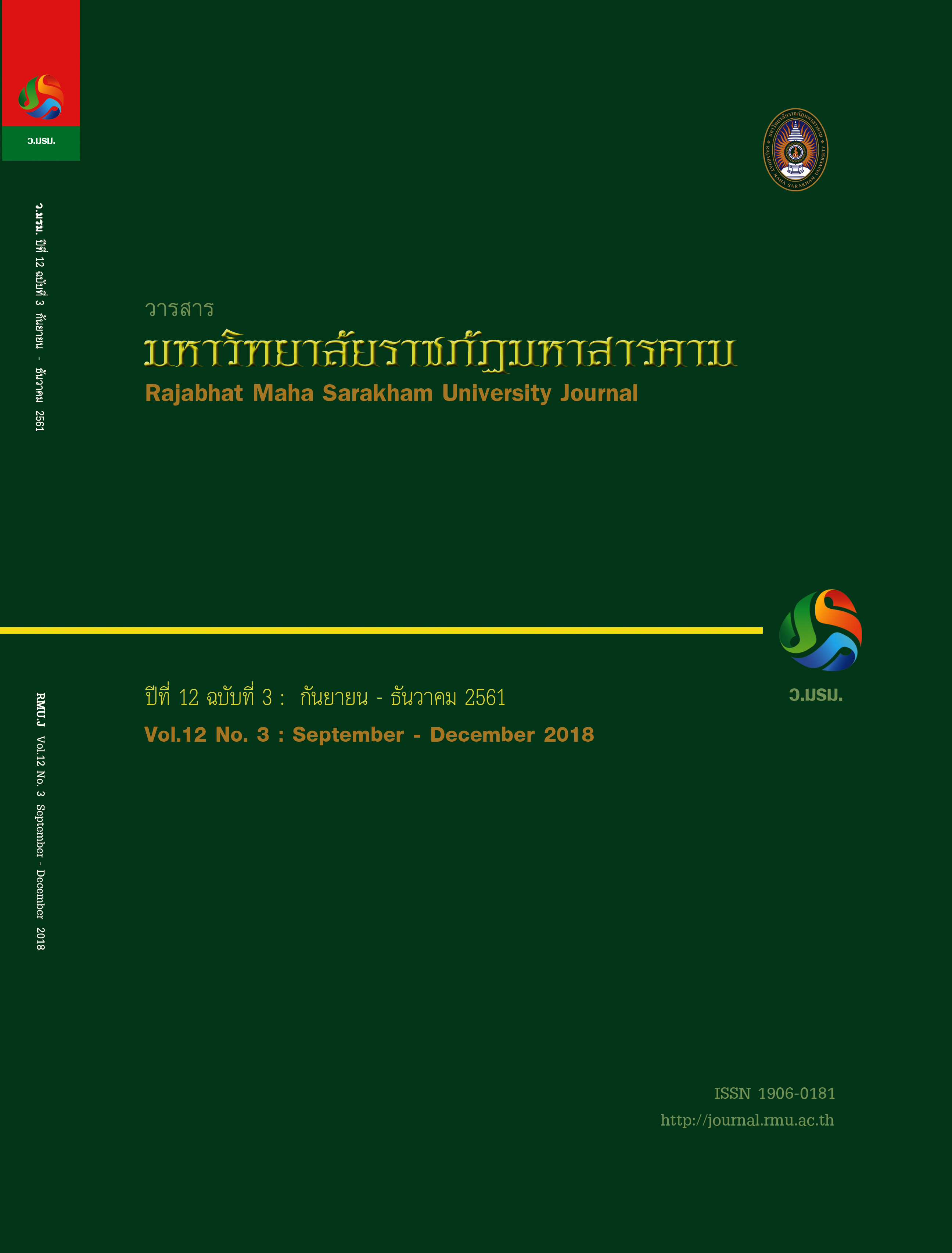การพัฒนารูปแบบการประเมินการจัดการเรียนรู้เพื่อส่งเสริมทักษะชีวิตในศตวรรษที่ 21 ของนักเรียนระดับมัธยมศึกษาตอนต้น
Main Article Content
บทคัดย่อ
การวิจัยครั้งนี้มีวัตถุประสงค์เพื่อพัฒนารูปแบบการประเมินการจัดการเรียนรู้เพื่อส่งเสริมทักษะชีวิตในศตวรรษที่ 21 ของนักเรียนระดับมัธยมศึกษาตอนต้น โดยใช้กระบวนการวิจัยและพัฒนา (Research and Development) ดำเนินการวิจัย 4 ระยะ ประกอบด้วย ระยะที่ 1 ศึกษา วิเคราะห์ สังเคราะห์ องค์ประกอบ ตัวบ่งชี้ การประเมินการจัดการเรียนรู้เพื่อส่งเสริมทักษะชีวิตในศตวรรษที่ 21 ของนักเรียนระดับมัธยมศึกษาตอนต้น และสัมภาษณ์ผู้ทรงคุณวุฒิ จำนวน 4 คน ระยะที่ 2 พัฒนารูปแบบการประเมินการจัดการเรียนรู้เพื่อส่งเสริมทักษะชีวิตในศตวรรษที่ 21 ของนักเรียนระดับมัธยมศึกษาตอนต้น โดยนำสารสนเทศจากระยะที่ 1 ยกร่างรูปแบบและให้ผู้เชี่ยวชาญตรวจสอบความเหมาะสมและความเป็นไปได้ของร่างรูปแบบการประเมินด้วยเทคนิคการประชุมอภิปรายแบบพหุลักษณะเพื่อหาฉันทามิติ (Multi Attribute Consensus Reaching : MACR) โดยผู้เชี่ยวชาญจำนวน 12 คน จัดทำคู่มือรูปแบบการประเมิน นำคู่มือการประเมินให้ผู้เชี่ยวชาญจำนวน 5 คน ตรวจสอบความเหมาะสม ความครอบคลุม ความชัดเจนของคู่มือการประเมินก่อนนำไปใช้จริง ระยะที่ 3 ทดลองใช้รูปแบบการประเมิน โดยนำรูปแบบการประเมินไปทดลองใช้กับโรงเรียนในจังหวัดมหาสารคามที่เปิดสอนระดับมัธยมศึกษาตอนต้น จำนวน 7 โรงเรียน กลุ่มตัวอย่างได้มาโดยวิธีการเลือกแบบเจาะจง (Purposive Sampling) ระยะที่ 4 ประเมินรูปแบบการประเมิน โดยได้พัฒนาเครื่องมือที่ใช้ในการประเมินรูปแบบการประเมินที่ยึดเกณฑ์การประเมินของคณะกรรมการพัฒนาเกณฑ์การประเมินทางการศึกษา โดยมีผู้ประเมินเป็นผู้ที่เกี่ยวข้องกับการทดลองใช้รูปแบบการแบบประเมิน จำนวน 35 คน เครื่องมือที่ใช้ในการวิจัยเป็นแบบสัมภาษณ์ แบบประเมินมีลักษณะเป็นแบบรูบริคสกอร์ และแบบมาตราส่วนประมาณค่า 5 ระดับ วิเคราะห์ข้อมูลเชิงคุณภาพ และเชิงปริมาณ โดยใช้สถิติพื้นฐานได้แก่ ค่าเฉลี่ย ส่วนเบี่ยงเบนมาตรฐาน ผลการวิจัย พบว่า รูปแบบการประเมินการจัดการเรียนรู้เพื่อส่งเสริมทักษะชีวิตในศตวรรษที่ 21 ของนักเรียนระดับมัธยมศึกษาตอนต้นมีลักษณะเป็นแบบแผนภูมิโครงสร้างที่สัมพันธ์กัน 6 องค์ประกอบ คือ หัวข้อการประเมิน วัตถุประสงค์ของการประเมิน สิ่งที่มุ่งประเมิน วิธีการประเมิน ผู้ทำการประเมิน และเกณฑ์การประเมิน สิ่งที่มุ่งประเมิน ได้แก่ ด้านการบริหารการเรียนรู้ ด้านปัจจัยที่เอื้อต่อการเรียนรู้ ด้านคุณลักษณะของครู ด้านการจัดการเรียนรู้ และด้านผลการเรียนรู้ วิธีการประเมินประกอบด้วย ขั้นตอนการประเมิน เครื่องมือที่ใช้ในการประเมิน และระยะเวลาในการประเมิน เกณฑ์การประเมินเป็นเกณฑ์สัมบูรณ์ ที่พัฒนาโดยผู้เชี่ยวชาญ และผลการประเมินรูปแบบการประเมินการจัดการเรียนรู้เพื่อส่งเสริมทักษะชีวิตในศตวรรษที่ 21 ของนักเรียนระดับมัธยมศึกษาตอนต้น ด้านความเหมาะสม ด้านความถูกต้องด้านความเป็นไปได้ และด้านการใช้ประโยชน์โดยรวมอยู่ในระดับมาก
Article Details

อนุญาตภายใต้เงื่อนไข Creative Commons Attribution-NonCommercial-NoDerivatives 4.0 International License.
1. บทความที่ลงตีพิมพ์ทุกเรื่องได้รับการตรวจทางวิชาการโดยผู้ประเมินอิสระ ผู้ทรงคุณวุฒิ (Peer Review) สาขาที่เกี่ยวข้อง อย่างน้อย 3 ท่าน ในรูปแบบ Double blind review
2. ข้อคิดเห็นใด ๆ ของบทความที่ลงตีพิมพ์ในวารสารมหาวิทยาลัยราชภัฏมหาสารคาม นี้เป็นของผู้เขียน คณะผู้จัดทำวารสารไม่จำเป็นต้องเห็นด้วย
3. กองบรรณาธิการวารสารมหาวิทยาลัยราชภัฏมหาสารคาม ไม่สงวนสิทธิ์การคัดลอกแต่ให้อ้างอิงแสดงที่มา
เอกสารอ้างอิง
Office of Academic and Educational Standards.(2011). Life Skills Enhancement According to Focus on Quality Development of Primary and Secondary Students. Bangkok : The Agricultural and Cooperative Federation of Thailand.
Office of the Education Council. (2011). The Results Report Drives the Reform of Education in the Second Decade 2009-2011. Bangkok : Phikhwan Graphic.
Johnstone. (1981). Indicators of Education Systems. London :Unesco.
Wirot Sarrattana. (2013). New Paradigms in Education : Perspectives on 21st Century Education. Bangkok : Thipphayawisud.
Jame Beluga. (2013). New Future Skills: Study for the 21st Century. (Woraphot Wongkitrungrueng and Athip Jittakrid, Translators).2nd ed. Bangkok : Open World (Original manuscriptin 2011).
Office of Academic and Educational Standards. (2012). Life skills development guidelines by integrating teaching and learning of 8 Learning Groups of Core Curriculum Basic Education2008. Bangkok : The Agricultural and Cooperative Federation of Thailand.
King Mongkut's Institute of Technology North Bangkok. (2002). QA-NEW. Bangkok : Education Quality Assurance Center.
Sirichai Kanjanawasee. (2009). Evaluation Theory. 2nd Ed. Bangkok : Chulalongkorn University.
krissanakiddee. (2004).Development of Evaluation Model of Child-center Teaching and Learning. Doctor of Education Thesis: Chulalongkorn University.
Bunchom Srisa-ard. (2003). Curriculum Development and Curriculum Research. Bangkok : Suweeriyasarn.
Somwung Pitiyanuwat. (1998). Methodology of Educational Evaluation. Bangkok : Chulalongkorn University.
Chailikhid Soi Phetkasem. (2004).A Development of an Evaluation Model of Teacher’s Learning Process in Schools under the Office of the Basic Education Commission. Doctor of Education Thesis : Naresuan University.
Wittayakorn Chiengkul. (2016). Thai education in 2014/2015: How to reform your education to the 21st Century?. Bangkok :Phimdee Printing.
Nevo, D. (1983). The Conceptualization of Educational Evaluation : An Analytical Reviewof the Literature. Review of Educational Research. 53(1).
Joint Committee. (1994). The Joint Committee on Standards for Educational Evaluation. New York : Mc Graw–Hill.
Office of the Basic Education Commission. (2012).Life Skills Development in the Basic Education System.. Bangkok : Office of the Basic Education Commission.
Office of Kalasin Primary Education Area, 3. (2013). Synthesis Report on Life Skills Promotion Activities of Schools under the Office of Kalasin Primary Education Area 3.Kalasin : Office of Kalasin Primary Education Area 3.
Ratana Buason. (2012). Direction and Assessment Area. 3rd Ed.Nakornsawan :Rimping Printing.
Nongluk Wirachchai, Sajeemart Na Wichien and Phidsamai Orrathai. (2008). Survey and synthesis of moral indicators. Bangkok : Phikhwan Graphic Co. Ltd.
Ormthajit Phaensri. (2008). Development of Evaluation Model of Bilingual education Management in School under Basic Education. Doctor of Education Thesis : Naresuan University.
Amorn Malasri. (2011). Development of Educational Risk Assessment Model for Rajabhat University. Doctor of Education Thesis: Mahasarakrm university.
Penprapa Kuaphithak. (2012).Development of Evaluation model of learning management of foreign language teachers in Primary School of International Standard School. Doctor of Education Thesis : Mahasarakrm university.


